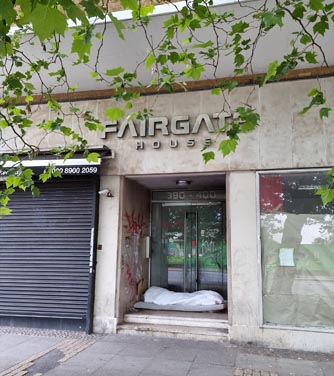Crisis, the homelessness charity, with the National Police Chiefs’ Council (NPCC), has published a guide for police, local authorities and others, sharing ideas and experiences about how best to respond to street homelessness. Mark Rowe reports on what it may offer for private security when coming across the homeless.
“Criminalising some of society’s most exposed members reflects poorly on the way society treats people who have experienced poverty and trauma. It also reminds us that we are not doing what works to end begging and rough sleeping. People experiencing one of the most visible and extreme forms of homelessness must have support and housing to move away from the streets for good.”
That’s from the end of the Crisis and police guide, that has a joint foreword by Matt Downie, Director of Policy External Affairs at Crisis; and Essex Assistant Chief Constable Andy Prophet, NPCC Lead for ASB and Homelessness. Their aim; ‘to offer the best evidence on ending rough sleeping and/or begging, and specific examples of police forces and local authorities working well with other services’. That police and those working directly for the homeless have come together shows that police are anxious to take what the guide terms a ‘problem-solving approach’ rather than criminalise someone for sleeping rough and begging – which has been de-criminalised for some time, as Professional Security recalls a private investigator telling him in Manchester several years ago.
Hence the document speaks of ‘trauma-informed approaches within policing and the criminal justice system, that ‘take into account what has happened to people who are sleeping rough, begging or engaged in street-based activities, and it means taking a problem-solving approach’.
Early on, the guide does accept that ‘where genuine anti-social behaviour is taking place, this should be dealt with’. Elsewhere in the document, the need for ‘enforcement’ from the police and probationary services is acknowledged, as ‘essential in helping people engage with the project [the guide offers many examples of work to bring the homeless into tenancies and out of drug addiction and other harms] in the first place’. In other words, as one local government manager stressed to Professional Security last month, every rough sleeper – in the jargon, the ‘street community’ are not only known to the council, but have been offered accommodation, and are quite closely monitored including by medics.
Leaving aside any politics of homelessness, the 2010s saw homeless not only in London (pictured; Wembley empty shop front) and main cities but in towns that had not previously seen people sleeping out in shop doorways. The September 2020 print edition of Professional Security magazine featured homelessness and found it was a security management issue – indeed, throughout the western world, in Hamburg and Vancouver besides Ilfracombe and Reading.
It is at the same time local – as patrolling night security officers or street wardens employed by business improvement districts (BIDs) are likely to come across rough sleepers on their rounds. Professional Security saw Venture Security patrollers employed by Salisbury City Council on patrol and talking to members of the ‘street community’ one weekday morning in November 2019, featured in the December 2019 print edition. In other words, the work once done by beat police officers is now routinely done – if it is done at all – by hired private security, and police are the 999 service that arrives with blue lights in an emergency.
As the police and Crisis foreword points out, rather than any policing response, ‘more provision is needed in most places for people rough sleeping with severe mental health and substance abuse needs’. Yet if enforcing the law is not the answer, the ‘right mix of responses can be difficult’ and will be different in towns and cities. And if the public and local businesses report issues of public safety – rough sleepers urinating in public, abusing illegal drugs, being anti-social, intimidating shoppers – the guide makes the point that those vulnerable people – who may suffer from mental ill-health – can be the victims of crime too. Which often goes unreported.
Whatever is the answer to homelessness, the guide and foreword do not expect it to come soon – it ‘may take months or even years of assertive but trauma-informed outreach’. Perhaps quite the opposite; the guide notes that councils and charities have seen ‘an increased demand for their [homelessness] services since the pandemic began’.









